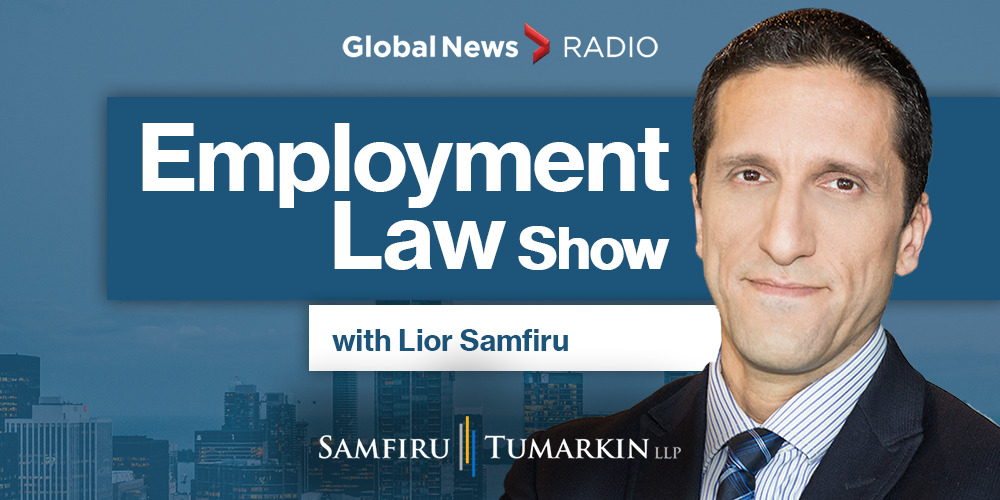Employment Law Show 640 Toronto – S9 E29

Episode Summary
Temporary layoffs, constructive dismissals, laid off while on disability leave, and more on Season 9 Episode 29 of the Employment Law Show on Global News Radio 640 Toronto.
Listen below as Employment Lawyer Lior Samfiru, Partner at Samfiru Tumarkin LLP, reveals your workplace rights in Toronto, the GTA, Hamilton, London, and across Ontario on the Employment Law Show. Lior shatters myths and misconceptions about severance pay, terminations, workplace harassment, overtime pay, wrongful dismissal, constructive dismissal, duty to accommodate, independent contractors, and more.
Listen to the Episode
Episode Notes
I’ve been on a layoff for months and my company is only calling back the younger and not senior employees. What should I do?
Employers are not permitted to lay off employees temporarily if they have not consented to it. Employees who have been laid off can treat the layoff as a termination and pursue their severance if they wish.
My son has worked for 9 years for an international company and was told recently they will be closing in Canada. What should he be offered in terms of severance?
Severance entitlements will be the same in every province in Canada other than Quebec. Severance is based on a number of factors including age, position and length of service.
Through restructuring at her workplace, my wife has had a lot more on her plate which has caused stress and anxiety. Does she have a case for constructive dismissal?
In order for it to be constructive dismissal in Ontario, an individual would have to be able to prove that their job has been significantly impacted; whether or not the role has been affected negatively.
My employer informed me they are re-structuring and I was given the option to resign and offered two weeks’ pay. is this right?
An employee cannot be forced to resign, it must be voluntary. If a position is no longer available, that is considered a termination and an employee is entitled to severance.
I was told I was on a layoff as business was slowing down but now I’m being made aware someone else has filled my position. What do I do?
Regardless of the reason an employer gives, employers do not have the right to put employees on a layoff without their consent. Employees on a layoff can choose to treat the layoff as at termination. Employers who lay employees off if they have a medical condition are in violation of the human rights code.
What should you do if you have been let go from your job?
If let go from your position, you should contact an employment lawyer before agreeing or signing a release. Employers are often unaware or do not properly calculate what an employee is owed in terms of severance.
Should you call an employment lawyer if you have been put on a temporary layoff?
If put on a temporary layoff an employee should contact an employment lawyer as the layoff is typically not legal and they can choose to treat it as a termination.
What if the company you work for is small and doesn’t have the economic resources to pay severance; what do you do if you’ve been let go?
There are employment laws in place in regard to severance entitlements. Unfortunately, if a company has declared bankruptcy, an employee will be unable to pursue their severance.
What should an employee do if their employer is slowly building a case against them?
For employees who feel their employer is building a case against them, possibly with bad performance reviews, it is important to contact an employment lawyer to discuss their options.
I’ve been on long-term disability for almost two years and my benefits are being cut off. My employer says I should be dealing with insurance to resolve this matter. What are their obligations?
Claimants who have been cut off from their disability benefits have to resolve the issue with the insurance company, not the employer. Claimants should contact a disability lawyer as appeals typically are not effective.
If someone is fired for cause, what does cause mean and does that mean there are no obligations for severance?
Fire for cause occurs when an employee is guilty of significant misconduct and the employer has done everything in order to fix the problem but has been unable to do so. It is very difficult to prove termination for cause but if proven, the former employee is not owed severance.




